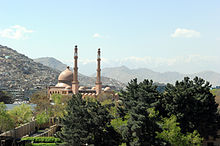Poetry of Afghanistan
Poetry of the modern-day region called Afghanistan has ancient roots, which is mostly written in Dari and Pashto.[1] Afghan poetry relates to the culture of Afghanistan and is an element of Afghan literature.
| Part of a series on the |
| Culture of Afghanistan |
|---|
 |
| History |
| People |
| Languages |
| Mythology |
| Cuisine |
| Festivals |
| Religion |
| Sport |
History
This section needs expansion. You can help by adding to it. (October 2021) |
The region called Afghanistan nowadays was noted for its poetic language even before the Islamic conquest of Afghanistan in the 7th through 11th centuries. The Pata Khazana, if authentic, contains Pashto poetry written as far back as the 8th Century. Some of the famous poets who were born or lived in the region of present-day Afghanistan include Rumi,Khushal Khan Khattak, Rahman Baba, Ahmad Shah Durrani, Timur Shah Durrani, Shuja Shah Durrani, Ghulam Muhammad Tarzi, Ghulam Habib Nawabi, Massoud Nawabi, Homaira Nakhat Dastgirzada and many others.[2]
The nation also has a number of female poets, such as Rabia Balkhi, 17th century Nazo Tokhi, and others. Due to political unrest and wars in the country, many women poets have remained hidden. Today, there are very few established young Afghan women poets like Afghan American Sajia Alaha Ahrar, a student at the University of Mary Washington in the United States, wrote a poem in 2010 entitled "Desire for World's Peace".[3][4]
Styles
This section is empty. You can help by adding to it. (October 2021) |
See also
References
- ^ "Afghanistan Online: A Touch of Afghan Poetry". www.afghan-web.com. 12 March 2018. Retrieved 7 April 2018.
- ^ "Afghanistan Online: Classical Afghan Poets". www.afghan-web.com. Retrieved 7 April 2018.
- ^ "World Poetry Featured Afghan Youth Poet Alaha Ahrar - World Poetry Reading Series". worldpoetry.ca. Retrieved 7 April 2018.
- ^ Mohammadi, Reza (21 May 2012). "Afghanistan has poetry in its soul - Reza Mohammadi". the Guardian. Retrieved 7 April 2018.
